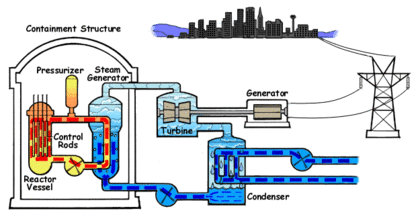Questions for Topic
- What parts of the world do they use nuclear for energy?
- How much money does it cost to transfer all of the nuclear energy?
- How does nuclear work?
- Witch is better for energy, nuclear or fossil fuels?
- What is the Fukushima-Daiichi Nuclear Disaster?
- How much money does it cost to transfer all of the nuclear energy?
What parts of the world use nuclear for energy?
So, nuclear energy is mostly in energy superpowers like United States, Russia and Canada have made nuclear power less an affective then it used to be. Well, nuclear energy is very popular as ever, even after the Fukushima-Daiichi Nuclear Disaster in 2011. The sources I got this from was the business insider, the name of the article was the 17 Countries Generating the Most Nuclear Power.
https://www.businessinsider.com/countries-generating-the-most-nuclear-energy-2014-3
What is the Fukushima-Daiichi Nuclear Disaster in 2011?
So, it was a it was nuclear disaster that happened in Japan. A nuclear plant that as surrounded by fields and forests. But one day in 2011 everyone in the town Namie had the residents of 21,000 were told to leave the town. In 2012 the arrange amount of electricity consumption per houses in fell by 8% in some areas in 2012, it was from a Japan government survey. The disaster made a huge amount of coal, gas and oil being used to make energy. After the disaster they had to close down 54 reactors in Japan. The safety failure was following a major earthquake, a 15-metre tsunami disabled the power supply and cooling of three Fukushima Daiichi reactors, causing a nuclear accident. Its from: The Economist. Publisher: Economist Intelligence Unit N.A. Incorporated, the website was Gale Power Search.
How Much does it cost to transfer nuclear energy?
The amount of money it costs is about (also including escalation and financing costs) $5,500/kW to $8,100/kW or between $6 billion and $9 billion. But that study was in 2008.
How does nuclear energy work?
The way nuclear energy works is that it has the atoms in system, the nucleus is in the middle of an atom; it goes around the electrons. The nucleus is made of protons and neutrons, they are densely packed together in the atom’s hydrogen the lightest element, and protons the heaviest natural element. Uranium has 92 protons in it, because uranium atoms are so big, the atomic force that goes together. It is relatively weak, making uranium good for fission. In nuclear plant the uranium spilt into neutrons. This split releases neutrons from the uranium that in turn collide with other atoms, causing a chain reaction, Making electricity. In the of nuclear reactors, the fission of uranium atoms releases energy, the water goes up water 520 degrees Fahrenheit. This hot water is then used to spin turbines that are connected to generators, producing electricity.
https://www.ucsusa.org/resources/how-nuclear-power-works
Which is nuclear energy better wise in cost than fossil fuels?
Is nuclear energy better or worst than fossil fuels? The main benefits of nuclear power is that it a lot more efficient than burning fossil fuels as the amount of energy release from uranium per gram is much more than that of fuels such as oil or coal; approximately 8,000 times than nuclear energy. For the most part nuclear power is a lot more dangerous then fossil fuels, in fact it kills 40 times more deaths per unit electric energy produced. It is also the benefits of using nuclear power is that it is a lot better than burning fossil fuels as the amount of energy released from uranium per gram a lot more than that of fuels such as oil or coal; approximately 8,000 times more efficient in fact.
Nuclear Power.
The End
Good information fluency post. I like how you have found some great sub-questions to lead you to get a well-rounded perspective on your topic. You briefly cited your sources. You did not answer all of the information fluency questions, however.